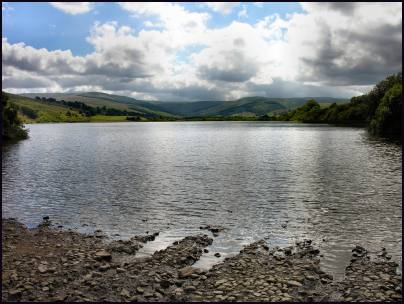Hill Hill Hill Hill May 4, 2011
Author: Beach Combing | in : Contemporary, Medieval, Modern , trackbackPlacenames, like history, are as much a product of human incompetence as human genius. Take the phenomenon of pleonastic placenames – an intimidating word signalling the limitations of language and understanding.
Rather than explain what is meant it is best to give an example, the Yorkshire placenames of Seamer Water (pictured above).
Working backwards, generally the best principle with placenames, water means ‘lake’ in modern English. Mer is mere from Middle English and means ‘lake’. Then sea (originally sae) means, you’ve guessed it, ‘lake’ giving us the delightfully nonsensical Lake Lake Lake.
But how do such bizarre names come about?
The explanation is that placenames evolve clumsily over the centuries.
In the case of Semer the lake was originally called sae. But with time the word dropped out of use or the pronunciation was not recognised.
At that point the local population added mere, their preferred word for a body of water, to a strange syllable beginning with ‘s’ that no longer meant anything to any of them.
The process was repeated when mer became obscure and water was tacked on.
Then in a thousand years…
Pleonastic names typically come about when different languages or different phases of the same language collide – something that is the essence of placenames. And there are hundreds if not thousands of examples of pleonastic placenames from around the world including some of the most famous in existence. The Sahara Desert is, for instance, translated Desert Desert. Lake Michigan equals Lake Large Lake. While the Rock of Gibraltar – long may it stand – is the Rock Rock of Tariq.
Beachcombing can’t say goodbye though without referring to the most famous pleonastic placename of them all. Torpenhow Hill in Cumbria.
Tor is Anglo-Saxon and means hill.
Pen is head or peak (e.g. Apennines): another hill.
How comes from Danish haugr, meaning hill.
And then finally modern English hill.
Translated this placename means Hill-hill-hill-hill.
Only it doesn’t.
This is a much repeated linguist legend.
Torr is likely a loan word from Celtic into Anglo-Saxon and Torr Pen would be something like the hill peak, which is boring but not redundant. So we have Hill-peak-hill-hill.
But even that is an exaggeration because Darryl Francis in a very enjoyable online essay – a classic of its kind – demonstrates that Torpenhow is a village but that there is no place named hill next to it! In other words, we have the utterly unremarkable Hill-peak-hill.
It seems very much as if holier-than-thou linguists have created and perpetuated a piece of cobblers.
Beachcombing is not in the least surprised.
Bad linguists!
Other peculiar placename phenomenona please: Beachcombing is particularly interested in the ‘myth’ (?) of the explorer who points at a mountain, asking his native guide for its local the name. The guide, confused, replies ‘finger’, the name for which the mountain is ever after known. drbeachcombing AT yahoo DOT com



